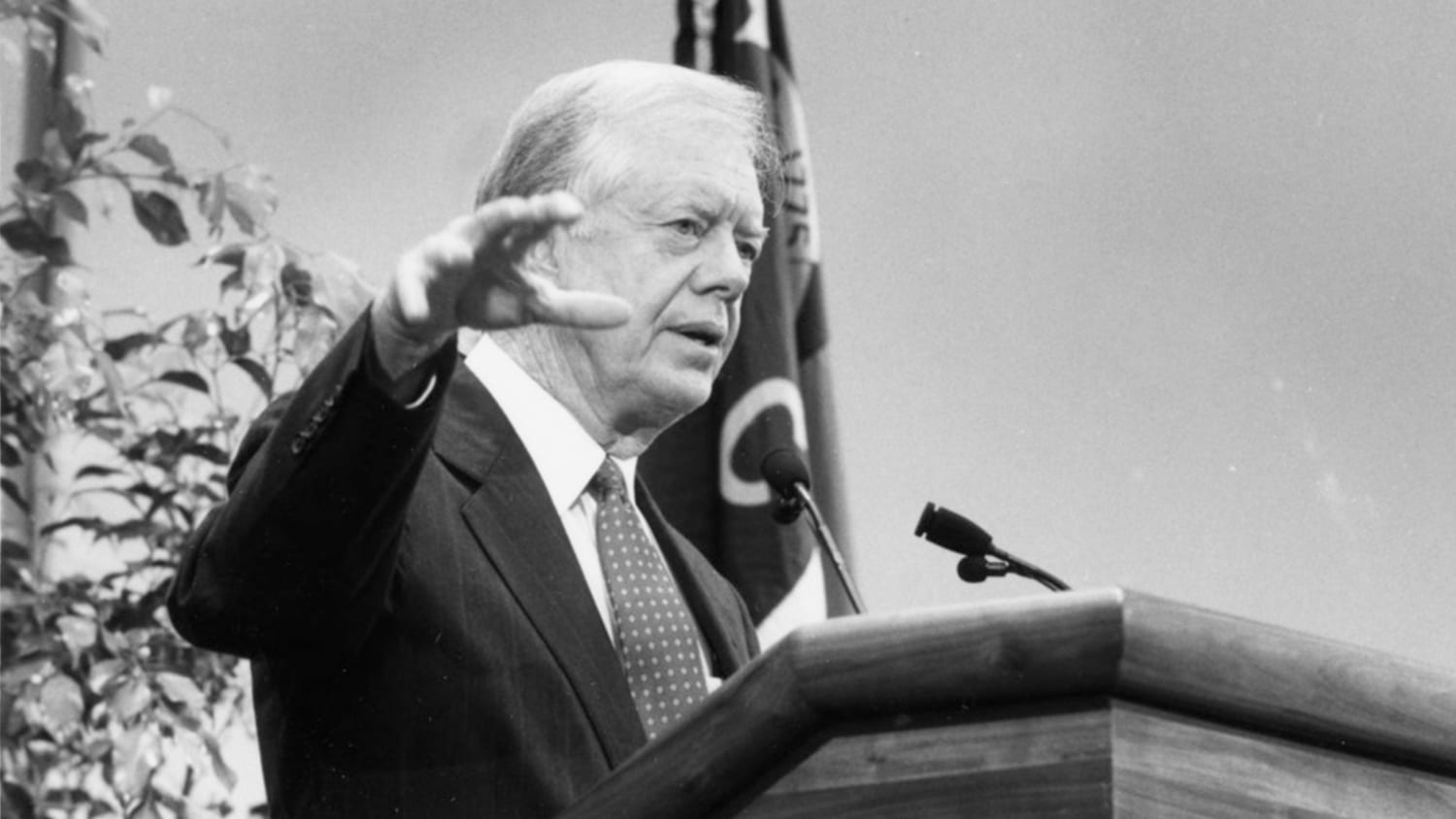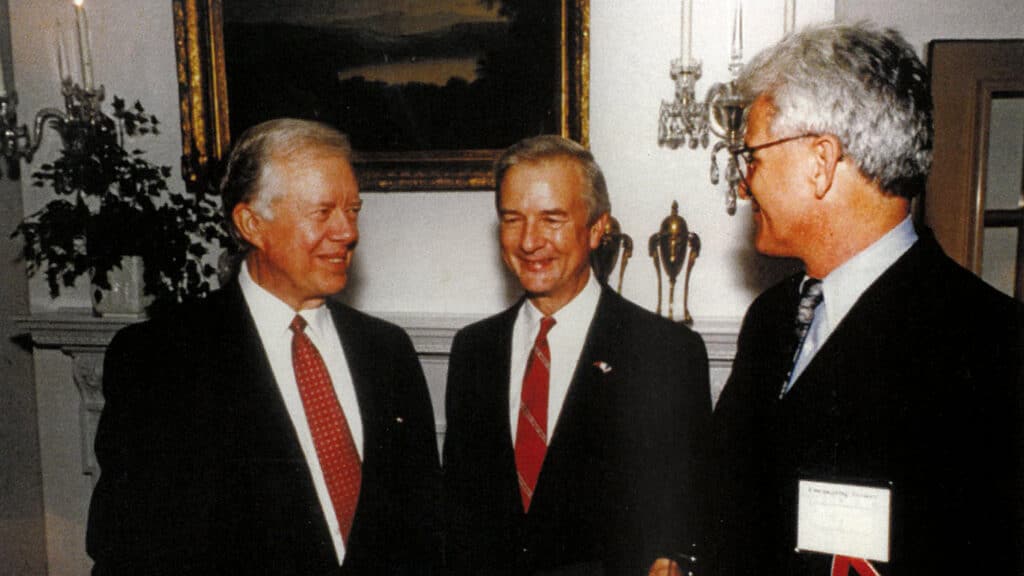Carter’s Global Vision From NC State’s Campus
Former President Jimmy Carter, who died at the age of 100 in December, was the keynote speaker at the sixth annual Emerging Issues Forum on Feb. 14, 1991, his only appearance at NC State.

It was a day of love and war. A Valentine’s Day in which the United States was preparing to lead an international coalition of military forces from 42 countries to liberate Kuwait from Iraq’s attempted takeover.
It was a time of uncertainty, when East and West Germany were reunified, but the Soviet Union was still together, even though it was in its dying throes. Five months later, the citizens of Baltic states Estonia, Latvia and Lithuania joined hands and sang their way to independence, a harmonic death rattle for the USSR.
It was a tumultuous year in which the United States needed to assume an even stronger presence in post-Cold War Europe.
And that was supposed to be the topic of the sixth annual Emerging Issues Forum, held on Feb. 14 and 15, 1991, at NC State’s McKimmon Center, highlighted by a keynote address from James Earl Carter Jr., 39th President of the United States.
Carter, who died on Dec. 29 at the age of 100, has been remembered in his Georgia hometown and throughout the country not just for his longevity, but also for being one of the most globally active world leaders in retirement, which included his 90-minute speech and question-and-answer session in front of 1,300 attendees. That appearance almost 31 years ago is one of the highlights of the forum, a Gov. Jim Hunt-inspired initiative that began in 1986 as NC State’s annual contribution to international, national and regional reform.

“I would like to see our great nation … take leadership in a finer quality of life for destitute and suffering people, for the promotion of a sustained basis of human rights, for the control of nuclear weapons, for improving the quality of the environment for us all, and particularly for the prevention of or the resolution of conflict by peaceful means,” Carter said of his vision for “America’s Place in the World,” which was the title of his NC State speech.
“To me, that defines what a great nation is.”
Carter spent most of his speech, however, talking about the Middle East, disease in Africa and poverty and political upheaval in South America — not exactly on topic for a two-day symposium entitled “Changes in Europe: Challenges in America.”
“Carter really was not very interested in Europe, not during his presidency and certainly not during his post-presidency,” says Nancy Mitchell, retired NC State professor of history and author of Jimmy Carter in Africa: Race and the Cold War (2016). “During the Cold War, he was much more interested in the periphery: Africa, Latin America, poorer countries.
“He barely mentioned Europe.”
A full wrap-up of the symposium — which featured Georgia Sen. Sam Nunn, future Secretary of State Madeleine Albright and a variety of international political and business leaders — that includes excerpts of Carter’s speech as well as other thoughts on the future after the Iron Curtain’s fall is available in this program.

It was an enormous coup to have Carter on campus, made possible by Hunt, the NC State alumnus who served four terms as governor of North Carolina and was the founding chair of the Institute for Emerging Issues.
“I don’t know of anyone better qualified to talk about America’s place in the world than Jimmy Carter,” Hunt said when he announced Carter’s appearance near the end of 1990. “As president, he negotiated the SALT II treaty with the Soviet Union, opened diplomatic relations with the People’s Republic of China and mediated the Camp David Accords, under which Israel and Egypt continue to coexist peacefully.”
Some 11 years before Carter won the 2002 Nobel Peace Prize, the former president elevated talk of an Israeli-Palestinian agreement above all else happening on the other side of the Atlantic Ocean, a challenge that still dominates global politics.
I don’t know of anyone better qualified to talk about America’s place in the world than Jimmy Carter.
To date, Carter is one of two U.S. presidents who have spoken at the forum, along with Bill Clinton in both 1988 and 2005, as part of a long line of presidential candidates, sitting presidents and past presidents who have visited NC State. Former Secretary of State Hillary Clinton and former Vice President Al Gore have also been featured at the forum, which has been held annually since 1986.
That line of political visits has been a valuable part of an NC State education since Assistant Secretary of the Navy Franklin D. Roosevelt gave the college’s 1913 commencement address.
“I think that’s the kind of thing that can motivate students and get them really engaged,” Mitchell says. “When I was still teaching, I took several trips with NC State students to do research at the Carter library and then on to Plains, Georgia, to see Carter teaching Sunday school.
“Something that simple deeply affected some of the career paths of some of those students. It’s not life-changing for everybody. It doesn’t solve all problems, but it is almost ridiculously powerful in its ability to move and inspire students.”
As Carter lies in state in Washington this weekend and is eventually buried next to his wife, Rosalyn, in Plains, Mitchell hopes there will be a larger reconsideration of Carter’s one-term presidency, which is generally viewed dimly in the wake of the poor economy during his time in office.
“I hope that history looks back on his presidency and sees that he was actually a very effective president,” she says. “It was an extremely difficult period of time because of the economy, which … presidents get blamed for but have really very little control over.”
- Categories:


